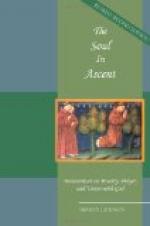Another confirmation of our conviction of the reality of life after death may be stated as follows: It is not possible for us to think of the heroes and singers of the ages as having less endurance than the words which they have uttered and the deeds which they have performed. Milton’s and Shakespeare’s bodies have long been dead. The great dramatist has recorded a dire curse on any one who should move his bones. In the chancel of the Church of the Holy Trinity at Stratford-on-Avon those bones are supposed to rest. But the plays that Shakespeare wrote are still the wonder of the world, and the glory of the English race. Is it possible to believe that the man was less enduring than his work? Is it possible to believe that Shakespeare’s plays and Milton’s epic will exist, perhaps, for a thousand years, while the dramatist himself has utterly ceased to be? You open a neglected drawer of your desk and come suddenly upon a letter written by a friend of half a century ago; the paper is a little soiled, but as firm as ever; the ink is hardly faded; the words are all clearly formed and full of inspiration; and you hold that letter in your hand and ask yourself, “Was the man who penned these lines less enduring than the paper on which he wrote, or than the ink with which he wrote?” Such questions are not arguments, and yet they have the force of arguments. It is not possible in our better moments to feel that the great and good, by whom this world has been lifted to its present condition, have gone entirely into nothingness.
It was said of our Lord, “It was not possible that such a man should be holden of death.” And it is not possible for us to believe, in our inmost souls, that those who become a part of our being, whose love is of more value to us than our own lives, whose memory is the dearest treasure that we possess, by some accident, a taint in the food or the water, can utterly pass from existence. If it were possible to believe that, then the most miserable creature on the earth would be man, for he would know of his greatness, and know also that his greatness is a mockery and a sham. In hours of doubt, let us lean hard upon the question, “Is it possible that those with whom we have walked and worked, conversed and communed, and by whom we have been helped and blessed, should forever cease to be, while the houses in which they live, and the tools with which they labor, will endure for generations?”
The soul is full of prophecies. Only as there may be continuance of being can these prophecies have fulfillment. The feeling of dependence, the desires for friendship which are never satisfied, the powers of body and of mind which are capable of a development which they never receive on earth, are prophecies of a life beyond death. Not the least among the reasons for our belief that death is not the end of the soul is the fact that the soul itself is a prophecy of its own immortality.




